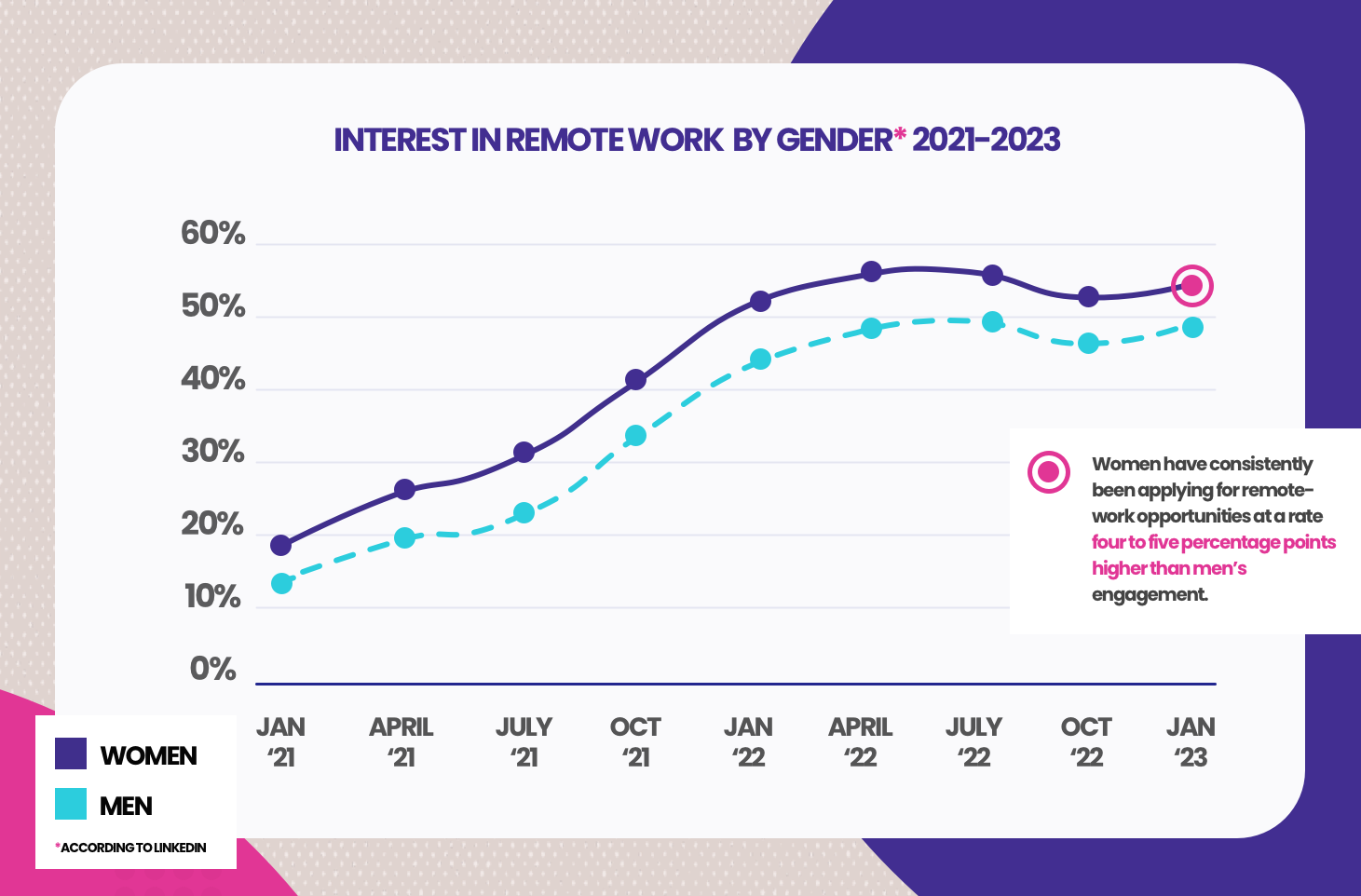As we honor Women's History Month, it's important to acknowledge women's unique workplace challenges. Despite the significant progress toward gender equality, women still encounter obstacles in professional environments, such as micro aggressions, harassment, and unequal pay. These barriers profoundly impact women's career growth and contribute to the gender gap in leadership positions. But there's one thing bridging that gap: remote work.
Women and Remote Work: The facts speak for themselves
Remote work can be a powerful tool to promote gender diversity and inclusion in the workplace by offering women more flexibility and autonomy and reducing bias in hiring. Organizations prioritizing a remote working environment can attract and retain talent and create a more inclusive and diverse workplace culture. And recent LinkedIn data supports this. Remote work statistics released by the platform show that the desaire to work remotely has doubled in the past two years, with women leading the way. Women have been applying for remote job opportunities at a rate of four to five percentage points higher than men. But we believe there are several obvious gender-based factors driving job seekers toward remote work.

Remote Work Opportunities Allow for Flexibility and Work-Life Balance
More women are choosing remote work because it helps them synchronize with their responsibilities outside of the workplace. Women are more likely to be the caregivers of their families and subsequently take on more non-work related tasks in child care and care of elderly family members than men. Remote work enables them to balance personal and professional life effectively by tailoring their schedules around familial obligations.
…And Reduces Gender Discrimination and Bias
The adoption of remote work has the potential to mitigate gender bias and discrimination against women and women of color in sectors that men have traditionally dominated. This is because, in virtual workplaces, assessments are primarily based on productivity and results rather than physical presence or aesthetics. As a result, remote can potentially reduce the impact of gender-related preconceptions and underlying biases.
Flexible Work Arrangements Increase Opportunities for Professional Development
Through remote work, women can access professional development opportunities that geographical barriers may have previously barred. Women of color are particularly disadvantaged in jobs that require a physical presence due to the lack of available mentors in their demographic to support, advocate, or promote them to leadership roles. Remote work allows for digital networking across webinars, web events, and other online engagements that leadership can support.
…And Subsequently, it Improves Mental and Physical Health
Remote work has the potential to significantly reduce the stress and expenses associated with daily commuting, allowing them to reclaim lost time. Long commutes can negatively impact physical health, as employees may spend extended periods sitting in a vehicle or on public transportation. Remote work has revolutionized the way organizations approach employee benefits, offering greater flexibility and customization to suit individual needs. With the elimination of geographical constraints, employees can work from their preferred location, enabling them to balance personal and professional lives more effectively.
Remote work also allows employees to avoid these sedentary periods, providing opportunities to engage in physical activities or integrate movement into their daily routine, which we've already shared the benefits of.
Remote Employees Have Access to Greater Financial Security
Remote work can lead to cost savings for women. Women have to deal with the pink tax or the expectation of grooming standards that are far higher than the ones demanded of their male colleagues. With remote work, they no longer need to spend money on commuting, work attire, or other expenses associated with working in an office environment.
…And Access to a Wider Range of Job Opportunities
Perhaps the most important aspect of work as we progress toward gender equality is equity. Remote has increased the number of job opportunities available to women, particularly those who may be geographically limited due to family or other commitments. Remote work allows women to apply for positions with companies based in different cities, states, or even countries, providing them with a broader range of professional options and the chance to advance their careers.
In short, remote work isn't a luxury; it's a necessity.
Remote work is not just a trend but a powerful catalyst for bridging the gender gap and promoting equity in the workplace. By embracing remote work, organizations can create a more inclusive and diverse workforce where women are empowered to thrive professionally and personally. This approach can help level the playing field, eliminate biases and discrimination, and ultimately contribute to closing the gender gap in leadership positions.
So, this Women's History Month, let us celebrate the incredible achievements of women who have come before us and pledge to be advocates for change, pushing for a more equitable and inclusive future. Embracing remote work as a standard practice is a crucial step in this journey. By doing so, businesses can become beacons of progress, fostering gender diversity and contributing to a world where women's potential is fully realized.
Never miss a beat

